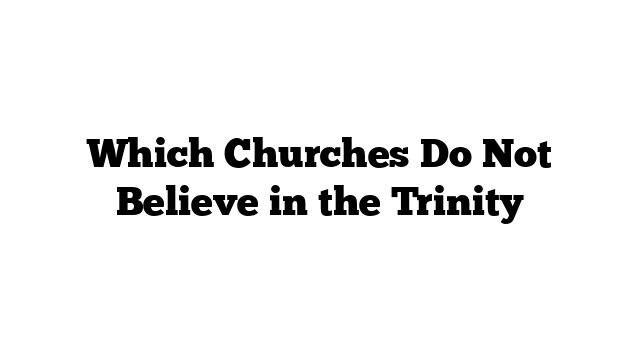Beliefs & Practices
Understanding Churches That Do Not Believe in the Trinity
Introduction
The Trinity is a fundamental doctrine in Christianity that teaches the belief in one God existing in three distinct persons: the Father, the Son (Jesus Christ), and the Holy Spirit. However, there are churches and sects within Christianity that do not adhere to this Trinitarian view. In this article, we will explore some of the churches that do not believe in the Trinity and discuss their beliefs and practices.
1. The Church of Jesus Christ of Latter-day Saints (LDS Church)
The LDS Church, also known as the Mormons, does not accept the Trinitarian concept of God. They believe that God the Father, Jesus Christ, and the Holy Spirit are three separate entities with distinct roles. According to their teachings, each of these beings has a physicality and can be seen as separate individuals. This belief is rooted in their sacred texts, including the Book of Mormon.
2. Jehovah’s Witnesses
Jehovah’s Witnesses are known for their rejection of the Trinity doctrine. They believe that Jesus Christ is a created being and the first of God’s creations, making him inferior to God the Father. They view the Holy Spirit as God’s active force rather than a separate person. Jehovah’s Witnesses emphasize the unity of God and maintain that worship should be directed solely towards Jehovah.
3. The Church of Christ, Scientist (Christian Science)
Christian Science is a religious movement that does not accept the orthodox Trinity. They view God as a single divine Principle or Mind, rejecting the notion of God as three persons. They believe that Jesus Christ was a human being who manifested the Christ consciousness, but they do not see him as God incarnate. Christian Scientists pray for healing and focus on spiritual understanding to overcome physical ailments.
4. Oneness Pentecostals (United Pentecostal Church International)
Oneness Pentecostals reject the doctrine of the Trinity and hold to a belief known as “Oneness.” They believe that God is singular in nature and manifests Himself in different forms, including as the Father, the Son (Jesus Christ), and the Holy Spirit. They argue that the Father, Son, and Holy Spirit are not separate persons but different modes or manifestations of God’s presence.
5. Unitarian Universalism
Unitarian Universalism is a liberal religious movement that encompasses diverse beliefs and practices. Many Unitarian Universalists do not adhere to the traditional Trinitarian concept of God. They affirm the unity of God but reject the idea of a triune God. Some Unitarian Universalists may identify as Christian, while others have broader spiritual beliefs that transcend traditional Christian doctrines.
Conclusion
While the majority of Christian denominations adhere to the doctrine of the Trinity, there are churches and sects within Christianity that hold different beliefs about the nature of God. The examples provided in this article, such as the LDS Church, Jehovah’s Witnesses, Christian Science, Oneness Pentecostals, and Unitarian Universalism, represent some of the churches that do not believe in the Trinity. It is important to respect and understand these diverse perspectives as they contribute to the broader landscape of Christianity.

